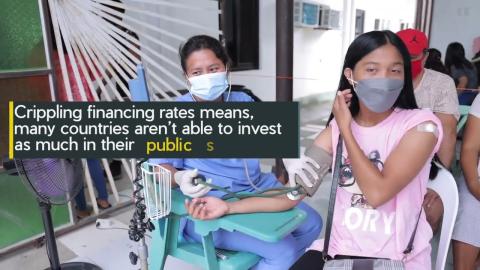Feature
Urgent SDG funding needed to bridge ‘great finance divide’

Since the Sustainable Development Goals (SDGs) were adopted in 2015, financing has been one of the key sticking points in delivering the goals by 2030—and the inequalities caused by the COVID-19 crisis have made this challenge even greater.
The pandemic recovery gap between countries is widening. While developed countries borrow and invest to shore up their economies, many developing countries sink deeper into a cycle of unsustainable debt, austerity, slowing growth, and growing poverty and hunger. New conflicts are also contributing to rising commodity prices, interest rates and inflation around the world, with the most vulnerable being hit the hardest.
To reverse this divergence and prevent a lost decade for sustainable development, wealthy countries must do more to overcome this "great finance divide.” For example, rich countries spend 3.5 per cent of their public revenue to pay interest on debt, while poor countries spend more than five times that much.
To keep the promise of leaving no one behind, developing countries should be able to invest their money in infrastructure and public services, not have their money tied up in debt. To do so will require improving access to affordable financing, creating a fair and effective international tax system, and reducing sovereign debt burdens.
These critical topics will be addressed this month at several key events organized by UN DESA:
- ECOSOC Special Meeting on International Cooperation in Tax Matters (8 April): Making progress towards a fair and effective international tax system will be in focus at this event. Participants will discuss options for fiscal measures to support more inclusive, resilient, and sustainable economies and societies. Solutions to increase domestic resources and chart a path forward for corporate tax reform would help developing countries increase their fiscal space to recover better. The event will also promote efforts to curb tax-related illicit financial flows.
- Launch of the 2022 Financing for Sustainable Development Report (12 April): The new report will present solutions to help countries find needed resources to close the finance divide and invest in sustainable development —for example, through strengthening the role of international public finance and addressing the high cost of financing on capital markets. It will also address rising risks of debt distress. The report will detail how countries can raise both new financing and align existing investment with combatting climate change and promoting gender equality, including rethinking incentives in the international financial system. The launch will be broadcast live on UN Web TV.
- “The Future of Sustainable Development Financing” Global Policy Dialogue (14 April): Experts from around the world will explore how to ensure reliable access to affordable financing as well as how to improve the international system for resolving situations of unsustainable debt. This public dialogue is free, open to all and will examine further the key solutions proposed in the financing report launched on 12 April. To register: bit.ly/dialogue14april
- ECOSOC Forum on Financing for Development (FFD Forum) (25-28 April): The annual Forum brings together heads of State and Government, other high-level government officials, and leaders from international organizations, civil society and the private sector to review progress and make recommendations on financing the SDGs. This year’s edition will highlight current issues such as building a sustainable and inclusive recovery and aligning the global debt architecture with the SDGs, drawing from the themes of the new 2022 Financing for Sustainable Development Report. The event will be broadcast on UN Web TV.
- SDG Investment Fair (26-28 April): In parallel with the FFD Forum, thought leaders and entrepreneurs from developing countries will have the opportunity to present high-impact, investment-ready projects to potential private sector investors. A panel of experts will provide feedback on the projects’ contribution to the SDGs, ideas to increase the projects’ bankability and raise resources, and relevant successful models to learn from. To register: bit.ly/April2022FairRegistration.
Strong action taken by the international community at these events to address the pressing financing challenges and fund climate and SDG action are our best hope to shrink the financing gap and ensure a healthy future for all.
 Welcome to the United Nations
Welcome to the United Nations